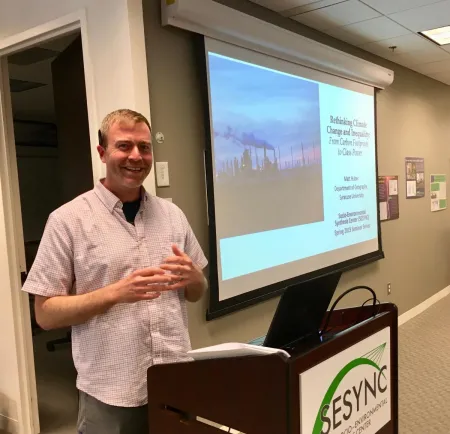Who should be held responsible for carbon dioxide emissions? To understand this problem, Dr. Matt Huber argues that we need to look beyond the sum of individual consumers’ choices. In his seminar at SESYNC on May 21, Huber said it is important to pay attention to who profits from the products and industries that contribute to climate change.
Paying attention to who profits is part of what Huber calls a “class approach” to understanding climate change and carbon emissions. “Class means more than inequalities between rich and poor consumers,” he said during his seminar, which was entitled “Rethinking Climate Change and Inequality: From Carbon Footprints to Class Power.” He emphasized that class is also about “who has the power to shape the productive enterprises of our society.”
Huber, an Associate Professor of Geography at Syracuse University, summarized different ways to attribute carbon emissions, such as the carbon footprint model. Calculating the portion of an individual’s carbon footprint that results from driving, for example, suggests that “the emissions coming out of a tailpipe are ours and ours alone,” Huber said. But those emissions are part of “a web of social relations,” he said, that go beyond the individual.
Another way to understand carbon footprints is what Huber described as the “territorial approach,” in which emissions are attributed to different countries. As he explained, this approach can imply that an individual country is fully responsible for the emissions resulting from industries whose products ultimately go beyond its borders, such as mobile phones. Another perspective, which Huber referred to as the “trade-based approach,” attributes the responsibility for emissions to the consumers who use a given product.
Focusing on individual consumers can encourage a sense of guilt, explained Huber. Making people feel guilty “is not going to resonate with the majority of people in our country who are already struggling economically, and they don’t really want to scale down,” Huber said. “If we want to solve climate change, and we want to do it democratically, we have to learn how to appeal to the larger bulk of society that doesn’t feel guilty about their carbon.”
Huber, who is currently working on a book about climate change and class for Verso Books, is not arguing that consumers are completely off the hook. But when responsibility for climate change is attributed solely to individuals, broader social processes can be ignored. “Systems of power,” he said, are “causing the problem.”
